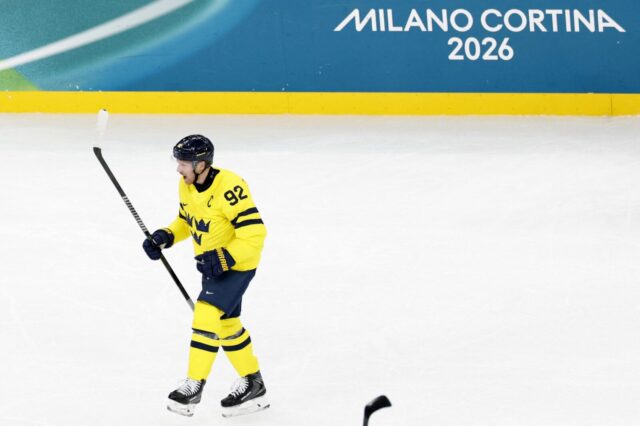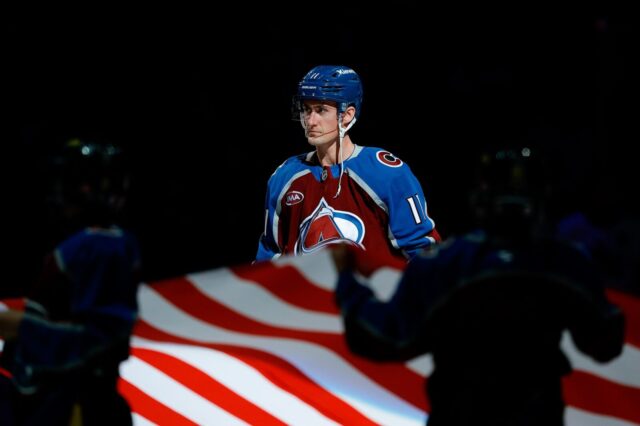This post-holiday stretch of hockey hasn’t been kind to the Colorado Avalanche.
The team has lost seven of its last eight games, erasing the good vibes of the recent four-game win streak and abolishing the memory of a time when the club was capable of closing out a game regardless of a lead or deficit.
The Ottawa Senators are in town and there’s a real sense that this slide could continue.
Like my colleague Peter Baugh from The Athletic said on Tuesday night, sometimes you are what your record says you are.
This is a tough pill for Avalanche fans to swallow, the fact that the defending Stanley Cup champions are facing the most adversity they’ve seen in a couple years.
Sure, injuries to Gabriel Landeskog, Valeri Nichushkin, Bowen Byram, and even Josh Manson aren’t helping. But neither is the fact that the team can’t seem to put together a dominant 60-minute effort these days, whether it’s against the 26th-ranked Vancouver Canucks, the 22nd-place Florida Panthers, the No. 2-seed Toronto Maple Leafs, or the—checks notes—second-to-last place Chicago Blackhawks.
Jared Bednar needs more from his team, and getting this not-so-merry band of misfits there is proving to be quite the challenge.
“Urgency [is] number one. Well, preparation and focus to get off to a good start and making sure that we get our energy level up from the drop of the puck. But that urgency, competitiveness, I think right away gives you the intensity that you play with,” Bednar said on Wednesday. “We’ve been revving that up when we’re down a couple of goals. I think it’s got to happen from the drop of the puck, number one, and then decision making. Part of the reason why we’ve had success at certain points in games, for me, is the way we manage the puck and the decision making, and then there’s a level of work that’s involved in [it]. If you make the right decision to put a puck in, you got to be willing to go work and get it back, and at times for me, that’s been a little sporadic. It’s some of the things that we talked to our group about this morning. They understand it. We tried to give them clarity.”
Preparation is the key word there, and it’s something to remember when the sky is falling and the losses are piling up and people are calling for the soon-to-be winningest coach in franchise history’s head.
This isn’t all on the coaching staff. There comes a point when the decision of a game is the responsibility of the players on the ice.
“I’m a firm believer that starts of the games are on individuals, honestly. I’ve said it before and I’ll say it again. There’s no—and I’m not just saying this, I’ve been around for a long time, but—there’s no better coached team and no more detailed team in terms of how we’re prepared, in terms of knowing exactly what other teams are trying to do—what their strengths are, what their weaknesses are—than our team,” Andrew Cogliano told me before New Years Eve.
“We’re very fortunate to have a staff like we [have] in terms of the details of how we need to execute to have success. And we won the Stanley Cup last year. I think that’s a fact that just shows how receptive and how driven guys are in this room. And I think there’s a great combination here, and there’s a great synergy between the coaching staff and the players. I think the coaching staff is very, very driven, and that leads into our players. And there’s a high standard. We truly think we should win every night. We are the championship team from last year, and we’re working towards the exact same goal. And in order to do that you got to have good synergy between the coaching staff and players, and I don’t think there’s much better in the league than what we have.”
Sometimes it’s allowing four goals in the first period. Sometimes it’s allowing a quick burst of goals in the second period. Sometimes it’s rallying from a four-goal deficit late in the game to tie things up before ceding that last marker to lose in regulation when you had the hope and belief that you could surmount the seemingly insurmountable.
Hockey isn’t easy.
“I’ve been around a long time. I’ve always been a firm believer that individual preparation is very key in this league because it’s a very tough league, and when you have that to a man and you go out and execute, you have a good chance to get off to good starts in games. So we got to get better at that. I think that’s been a weakness for us,” Cogliano said. “I think it’s on the players. We’re the ones out there. We’re the ones executing. We’re the ones playing, and I think recently we haven’t done a good job of being on our toes, being mentally kind of individually ready to take the play to them.”
That mindset is something that superstar and needed leader Nathan MacKinnon also feels is key to a squad having success.
“It’s all about the players. Each guy has to come ready to play for a team to play well,” MacKinnon said. “It starts individually. If you don’t do your job and do what you have to do, the team will suffer—especially if you play a lot of minutes and you’re relied upon. The systems are kind of second nature. It’s just up to you if you want to compete, make plays, be ready to go, be prepared. So I think everybody has to take it upon themselves to be ready individually, for sure.”
You can be assured, outside of the odd human-nature type of letdown here or there from the MacKinnons, Mikko Rantanens, Cale Makars and Alexandar Georgievs, those top-talent guys are always ready to play. They’re gamers. They want the puck on their stick, the breeze in their hair, the crowd chanting their name, and the wins attached to them.
The trouble is secondary and tertiary support on an injury-laden roster is nonexistent. There’s not enough coming from those guys, and that’s one area where this recent trouble is emanating from.
“I think we can always get more [from them]. I think the production is not there, but I try to judge them more on [things other than] talent,” Bednar said of the bulk of this current lineup. “If the work’s there, if the competitiveness is there, the determination is there, that’s all we can ask for. We can help them through some of the scoring issues if they’re not shooting the puck enough or if they’re always looking for the next play.
“So we kind of stay in tune with that, but some of it could just be talent level and some guys aren’t going to score a lot. We’re hoping that they do, but you always want to see a little bit more production out of all of your guys, especially when you’re going through a losing streak.”
And if you think help is coming from the Colorado Eagles up the street, think again. The pipeline that you saw so active at the start of the season has closed down.
“I feel like we’ve got the players that can help us get out of this and help us win hockey games here right now,” said Bednar.
The call needs to come from inside the house. The scoring needs to come from inside the dressing room. The leadership and no-quit ethos needs to come from the guys sitting on the bench.
The power play, the penalty kill, the on-time starts, the game-winning goals, and the Stanley Cup swagger all needs to come from the players.
The only way out of this, in the short-term, is through hard work. There’s no resting on laurels. There’s no sense in looking for the guy next to you or down the lineup to pick up your slack. There’s surely no trade coming when you’re on the outside of the playoffs and jealously looking in. And there’s certainly no change in coaching staff that’s going to salvage these lapses in effort.
“When you go through moments and times like this in a season, you got to sharpen up just a little bit more in terms of your individual preparation and kind of being on your toes and wanting to push the pace more than playing the other team’s hand and create momentum and do the little things right,” Cogliano said. “And if each guy does that individually, I think we come together as a team a little bit better and you get a couple games where we score the first goal. You get into a little bit more of a rhythm, and then all of a sudden you get out of this.”



